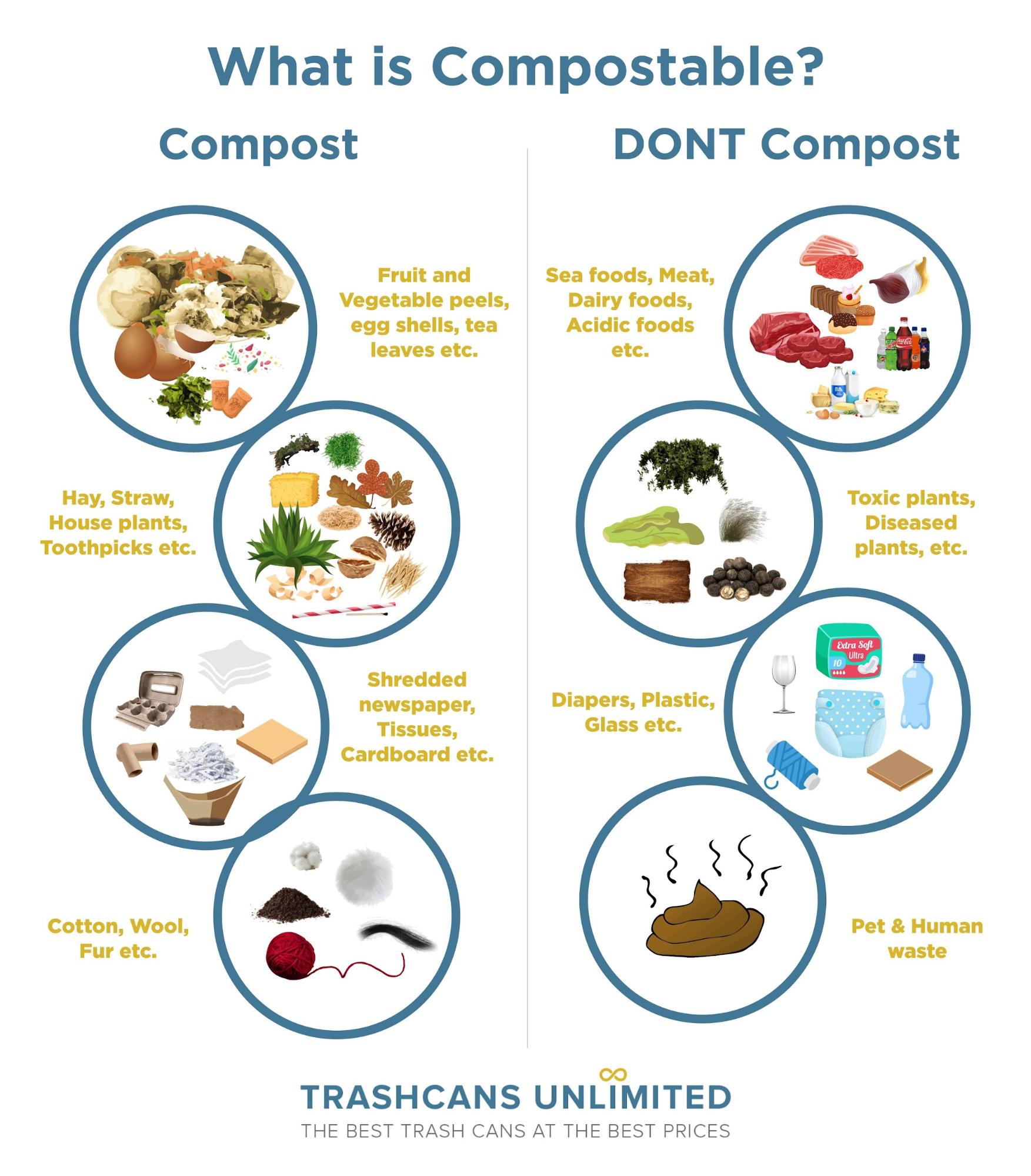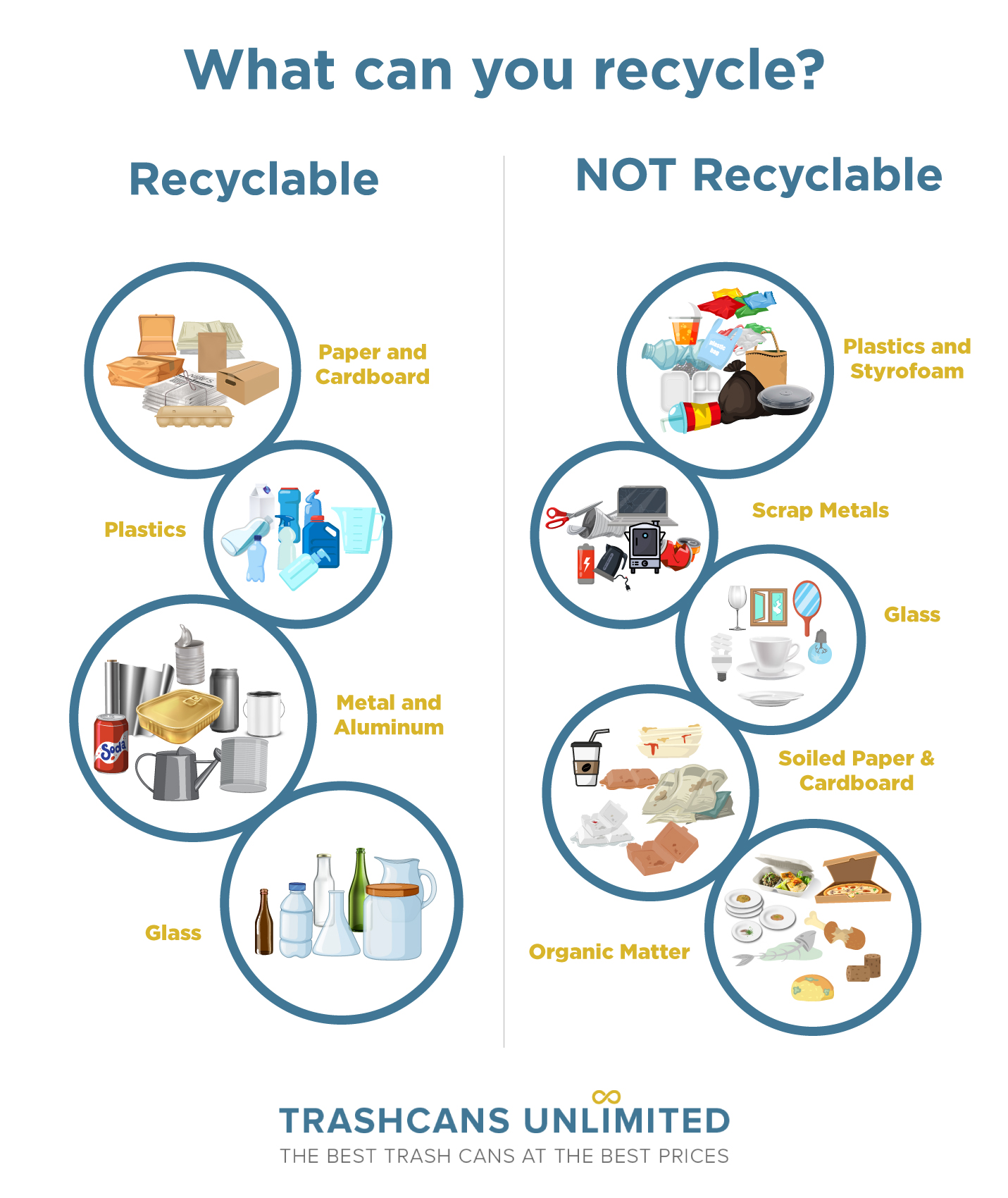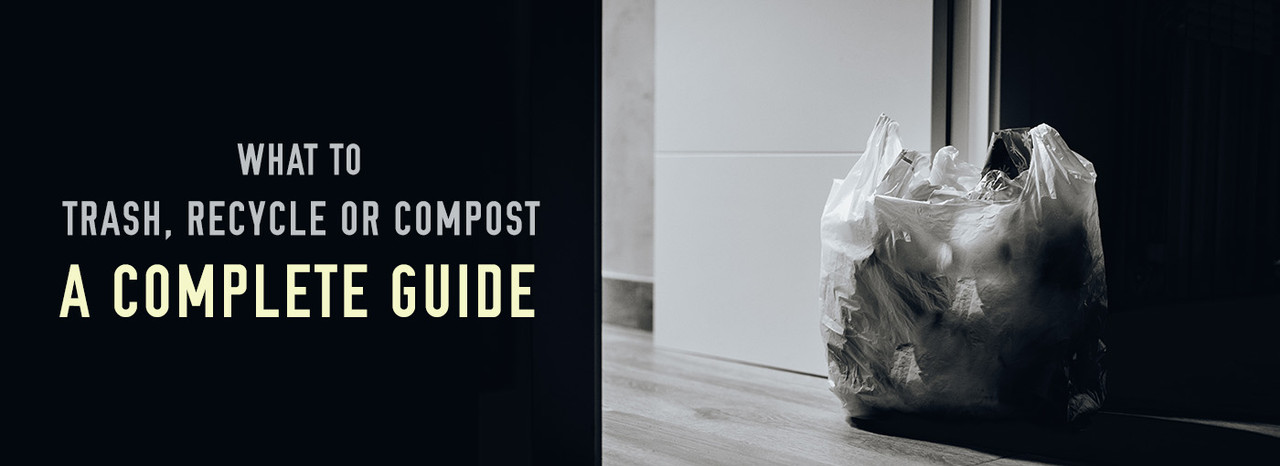With countless products passing through our homes each year, it isn’t always easy to determine their proper disposal. Trying to find out if a material should be trashed, recycled, or composted is often confusing, but luckily, there is a sure way to solve the issue.
Creating a consistent and confusion-free system not only streamlines your day-to-day activities, but it also reduces your overall carbon footprint. It’s all about a mindset—figure out the basic rules behind each option, and you’ll be good to go. To get started, check out this trusty, thorough guide for when to trash, recycle, or compost nearly any item in your home.
When To Compost
When it comes to composting, ask yourself a simple question: is this a food product my grandparents would recognize? Most basic food items can be broken down to their simplest forms through the process of composting. Compost at home or send your compostable food to a nearby center. Please note that wastes—including animal wastes—are not covered in this category.
Most basic food items can be composted. The primary requirement for a compostable material is that it consists of organic compounds which can be broken down into nutrient-rich soil. Most unprocessed foods (excluding cooked dairy and meat) can be sent to composting centers or composted at home to slowly break down into a reusable soil for fertilizing gardens and crops. This continuous cycle of natural waste is the most eco-friendly option for food disposal.

What can you compost?
Food Scraps
- Bread, grains, and pasta
- Coffee grounds with paper filter
- Dairy
- Eggs (and eggshells)
- Fruit
- Leftovers and spoiled foods
- Meat
- Seafood
- Tea and tea bags
- Vegetables
Food-soiled paper
- Coffee filters
- Greasy pizza boxes
- Paper cups and plates
- Paper ice cream containers
- Paper bags, napkins, tissues, and towels
- Paper take-out boxes and containers
- Tissues
- Waxy paper milk and juice cartons
Plants
- Branches and brush
- Flowers
- Grasses and weeds
- Leaves
- Tree trimmings
Other Compostable items
- Cotton balls and cotton swabs
- Hair, fur, and feathers
- Plastic and cutlery clearly labeled "compostable"
- Vegetable wood crates
- Waxed cardboard and paper
- Clean wood
- Wooden chopsticks
Items you cannot compost:
- Aluminum foil or trays
- "Biodegradable" plastic
- Cat litter or animal feces
- Ceramic dishware or glassware
- Clothing, linens, and rags
- Corks (natural or plastic)
- Diapers
- Dirt, rocks, or stone
- Flower pots or trays
- Foil-backed or plastic-backed paper
- Glass, metal, or plastic not labeled "compostable"
- Juice- or soy milk-type boxes with foil liner
- Liquids
- Plastic bags, wrappers, or film
- Recyclable/clean cardboard or paper
- Styrofoam
- Wood—plywood, pressboard, painted, or stained wood
Get the Right Compost Bins
The key component to any composting effort is a bin that’s designed to facilitate said composting. Many bins are designed to help aerate and control the composting process, so having the right bins is key. At Trashcans Unlimited, we have a huge amount of different bins available to meet your composting needs. We have composting bins with wheels that make transporting waste much easier.
Finding a handy bucket for transporting food scraps to the outdoor bin is also a great idea for making sure that your kitchen doesn’t get smelly from a larger composting bin, and also keeps the possibility of bugs on the low end. We also have different options for different types of materials, including metal and plastic.

When To Recycle
Your last resort is sending the item to the trash. This is reserved for items that cannot be reused, recycled, or turned back into nutrient-rich soil. Recyclable materials will usually include a marker to indicate where they belong. Most metals, plastics, and paper products are often recyclable via curbside pickup. Check out the original packaging or container for markers and numbers indicating their makeup. The correct bin depends on your town’s and recycling center’s requirements. Be sure to rinse any packaging or food containers before placing them in a recycling bin.
Your first line of defense against over-producing waste in your home is considering an item’s reusability. Many commonly collected items, such as plastic shopping bags and glass containers, can be transformed into both practical and decorative options for the home, saving both money and environmental impact.
If the item is not directly reusable in your home, chances are it can be broken down and reused in a more diverse manner via local recycling centers or mail-in programs. These recycling resources give extensive life spans to the hearty materials that we use in our daily lives.
In most cities, the following common materials are recyclable:
- Paper and cardboard
- Glass
- Metal
- Aluminum cans
- Aluminum foil and trays (ball foil up to softball size)
- Caps and lids from bottles, jars, and steel (tin) cans
- Steel (tin) cans
Be sure to remove all food and liquid residue from containers before placing them in the bin.
What can you recycle?
Plastic (except those labeled "compostable")
- Bottles
- Buckets
- Corks—plastic
- Jugs
- jars
- Laundry detergent bottles
- Molded plastic packaging
Paper (clean, dry, and unsoiled)
- Bags (paper only, no plastic)
- Cardboard (non-waxed)
- Cereal boxes and paperboard (remove plastic liner)
- Computer and office paper
- Egg cartons
- Junk mail and magazines
- Newspapers
- Packing or kraft paper
- Phonebooks
- Sticky notes
- Shredded paper (place in sealed paper bag, and label "shredded paper")
- Wrapping paper (non-metallic)
Glass (no liquids or food)
- Glass bottles and jars only (metal caps and lids too)
Items you cannot recycle:
- Batteries
- Ceramic dishware or glassware
- Clothing, linens, and rags
- Coat hangers
- Electronics
- Foil-backed or plastic-backed paper
- Waxed cardboard and paper
- Waxy paper milk or juice cartons
- Food scraps
- Glass mirrors and windows
- Juice- or soy milk-type boxes with foil liner
- Incandescent light bulbs
- Fluorescent light bulbs and HIDs
- Plastic bags, wrappers, or film
- Plastic items mixed with metal, fabric, or rubber
- Plastic labeled "compostable" or "biodegradable"
- Scrap metal
- Soiled paper—paper cups, plates, napkins, tissues, towels, take-out boxes, and greasy pizza boxes
- Styrofoam
- Wood
- Yard trimmings
Get the Right Recycle Bins
A critical part of making sure your composting efforts go the right way is to make sure that you have the right bins to sort non-compostable material. Get the right bins to prevent contamination and make sure that you can have an easy-to-use process for making compost.
When selecting the right recycling bins, you want to pick what’s going to work best with your space and your aesthetic. We have a huge amount of different types of recycling bins for you to choose from, including:
- Plastic recycle bins
- Aluminum recycling bins
- Stainless steel recycle bins
- Fiberglass recycling bins
- Recycling stations
- Recycle waste baskets
- Stackable recycle bins
In addition to recycle bins, use lids and decals and stickers for easy identification and to prevent contamination.
When To Trash
If the item cannot be composted or recycled, then it is fine to toss it in the trash. However, with particular attention to an item’s repurposing and recycling options, you may find that very little ends up in your trash can. Quite often, sending out compostable items and separating clean, recyclable containers also keeps smelly items out of your bin, extending the life of each trash can liner. This both saves money and contributes to your shrinking carbon footprint.
Making sure that you’ve got a healthy supply of bags that fit your cans properly and don’t leak is essential for success, and if you’re dealing with particularly smelly refuse, a lid for containment is essential.
What can you trash (in most cities)?
- Cat litter and animal feces (bagged)
- Ceramic dishware or glassware
- Clothing linens and rags
- Cigarette butts (extinguished—run under water prior to disposal)
- Dental floss
- Diapers
- Feminine hygiene products
- Foil-backed or plastic-backed paper
- Glass mirrors and windows
- Incandescent light bulbs (no fluorescents or HIDs)
- Juice- or soy milk-type boxes with foil liner
- Mylar (shiny metal) bags—potato chips, candy bars, balloons, etc.
- Pens and pencils
- Plastic bags, wrappers, and film not labeled "compostable"
- Plastic items mixed with metal, fabric, or rubber
- Rubber bands
- Six-pack ring holder (please cut up)
- Sponges
- Styrofoam
- Twist ties
- Wood—small pieces of plywood, pressboard, and painted or stained wood
Items that should not be trashed:
- Appliances
- Asbestos
- Batteries
- Coat hangers
- Construction debris
- Dirt, rocks, or stone
- Electronics
- Fluorescent or HID light bulbs
- Household hazardous waste or chemicals
- Large items—furniture, metal, plastic, wood
- Liquids or ice
- Motor oil (most cities allow you to leave out separately in an appropriately marked plastic container)
- Needles or syringes
- Paint
- Toys with electronics or batteries
Special Cases
Although large items can often be tossed in the trash or left on the curb for bulk pickup, it’s important to keep the hard work of our garbage collectors in mind, as well as the health of the landfill. Before throwing away the following items, consider seeking out a particular waste method after a bit of online research.
Special items to watch out for
Batteries
If you need to recycle a battery, look for household hazardous waste collection sites and some automotive shops. Many types of batteries do not go in the garbage; they can be recycled at county transfer stations or at local businesses. Often, hazardous waste collection facilities will take alkaline batteries of any kind, from button batteries to rechargeables.
Electronics
Don’t throw out your electronics, especially older ones. E-recycling centers are much better equipped to deal with computers, mainframes, desktops, monitors, LCDs, and cathode ray tube displays. Donating an old cell phone is a great way to ensure that it doesn’t just end up as trash.
Large Appliances & Mercury-Containing Products
Appliances can be repaired or donated for reuse. Older appliances may contain chlorofluorocarbons (CFCs), which qualified personnel must remove before disposal. This includes refrigerators and freezers, dishwashers, laundry machines, stoves, ranges, and furnaces.
Mercury-containing products pose significant health risks, and these products must be properly disposed of since they tend to contaminate the ground. This includes fluorescent bulbs and tubes, including “green tipped” or “low mercury” tubes and compact fluorescent (CFLs) bulbs and tubes, mercury switches, thermometers, and thermostats. If you’re trashing other hazardous materials like medical waste, you want to make sure that you have specifically marked receptacles and disposal sites to make sure that these materials are safe.
Get the Right Waste Bins from Trash Cans Unlimited
When a significant lifestyle change seems daunting, starting with small steps is the best way to make a long-term difference. These slight alterations not only keep your home fresh and clean but also impact the world as a whole.
In general, remember these three rules:
- Unmodified foods can be turned into rich, reusable soil.
- Common, cleanable materials can be sent away to be transformed into new products.
- Most other materials can be sent to the trash after a bit of research.
These considerations will improve your home, lifestyle, and the overall health of the world around us.
No matter what you’re disposing of, you’re going to need the right disposal container to do it. Depending on what you’re looking for, you want to make sure that you get trash cans made from the right materials, whether it’s wood, plastic, or metal. If you need a can that travels a long way, getting a can with wheels is the way to go. If you’re looking to dispose of trash in style, check out our designer trash cans, or get trash cans customized with your logo. Get in touch with us today.

